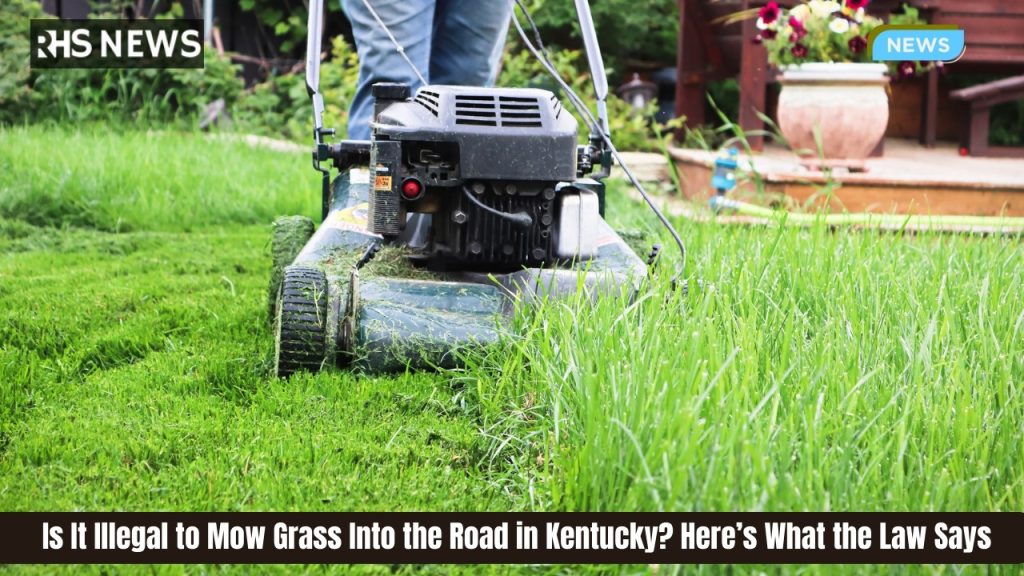Kentucky homeowners take pride in maintaining their lawns, but many are unaware of specific regulations governing how they dispose of grass clippings. The practice of blowing or mowing grass clippings directly into roadways has become a contentious issue across the Bluegrass State, with legal implications that extend beyond simple neighborly courtesy.
The act of depositing grass clippings on public roadways is indeed regulated under Kentucky law, though enforcement and specific penalties can vary significantly between municipalities. Understanding these regulations is crucial for homeowners who want to maintain their property while staying within legal boundaries.
Kentucky State Law on Grass Clippings in Roadways
This Article Includes
Under Kentucky Revised Statutes, specifically KRS 189.450, it is illegal to place, deposit, or dump any material on a public highway that could create a hazard to vehicular traffic. This broad statute encompasses grass clippings, leaves, snow, ice, and other debris that homeowners might inadvertently or intentionally place on roadways.
The law states that no person shall place or knowingly drop upon any part of a highway any destructive or injurious material. Grass clippings fall under this category because they can create slippery conditions, especially when wet, and can obstruct storm drains leading to flooding issues during heavy rainfall periods.
Kentucky’s Department of Transportation emphasizes that grass clippings on roadways pose legitimate safety concerns. When clippings accumulate on asphalt surfaces, they can become extremely slippery for motorcyclists, bicyclists, and even vehicles during wet conditions. Additionally, dried grass clippings can blow around and obscure drivers’ vision or clog drainage systems.
Safety Hazards Created by Grass Clippings on Roads
The prohibition against placing grass clippings on roadways stems from documented safety concerns that affect all types of vehicles and pedestrians. Understanding these hazards helps explain why Kentucky takes this issue seriously from both legal and public safety perspectives.
Motorcycle and Bicycle Safety
Fresh grass clippings create particularly dangerous conditions for motorcyclists and bicyclists. The organic matter acts similarly to ice when compressed under tires, causing loss of traction that can lead to serious accidents. Kentucky’s motorcycle fatality statistics show that road hazards contribute to approximately fifteen percent of motorcycle accidents statewide, with organic debris being a significant factor.
Vehicle Skidding Risks
Even passenger vehicles can experience reduced traction when driving over accumulated grass clippings, especially during wet weather conditions. The Kentucky Transportation Cabinet reports that debris-related accidents account for hundreds of traffic incidents annually across the state’s highway system.
Storm Drain Blockages
Grass clippings that wash into storm drains can cause significant flooding problems during heavy rainfall events. Kentucky’s topography and weather patterns make proper drainage crucial for preventing road flooding, and organic debris blockages can overwhelm municipal storm water systems.
Proper Grass Clipping Disposal Methods
Kentucky homeowners have several legal and environmentally responsible options for managing grass clippings without violating state or local ordinances. These methods not only keep homeowners compliant with the law but also provide environmental benefits.
Grasscycling Techniques
The most environmentally friendly approach involves leaving grass clippings on the lawn where they decompose naturally and provide nutrients to the soil. This practice, known as grasscycling, reduces the need for synthetic fertilizers and eliminates disposal concerns entirely. Kentucky’s agricultural extension service recommends this method for most lawn types common throughout the state.
Composting Programs
Many Kentucky municipalities offer composting programs where residents can drop off organic yard waste, including grass clippings. These programs convert organic materials into nutrient-rich compost that residents can often obtain for their own gardening needs. Cities like Bowling Green, Paducah, and Frankfort have established successful municipal composting initiatives.
Bagging for Collection
Traditional bagging remains a viable option in communities with yard waste collection services. Most Kentucky municipalities provide seasonal yard waste pickup, typically from April through November, when grass growing seasons are most active. Homeowners should check with their local waste management services for specific collection schedules and bag requirements.
Enforcement and Penalties
Enforcement of grass clipping regulations varies significantly across Kentucky, with some communities taking a more proactive approach than others. Understanding local enforcement practices helps homeowners avoid potential violations and penalties.
Citation Procedures
Most Kentucky municipalities follow a progressive enforcement model for grass clipping violations. Initial violations typically result in warning notices that inform homeowners of the specific ordinance violation and provide information about proper disposal methods. Subsequent violations usually incur monetary penalties that increase with repeat offenses.
Fine Structures
Penalty amounts vary considerably between jurisdictions, but typical first-offense fines range from twenty-five to one hundred dollars. Repeat violations can result in fines up to five hundred dollars in some communities, and chronic violators may face additional legal action including court appearances and potential liens on property for cleanup costs.
Reporting Mechanisms
Kentucky communities typically rely on citizen complaints and routine municipal inspections to identify grass clipping violations. Many cities have established online reporting systems where residents can document violations with photographs and location information for follow-up investigation.
Conclusion
Kentucky law clearly prohibits the practice of mowing or blowing grass clippings into public roadways, with good reason based on safety and environmental concerns. Homeowners throughout the Bluegrass State must familiarize themselves with both state regulations and local municipal ordinances to ensure compliance while maintaining their properties.
The combination of state statutes and local enforcement mechanisms creates a comprehensive regulatory framework designed to protect public safety and environmental quality. By adopting proper grass clipping disposal practices such as grasscycling, composting, or municipal collection programs, Kentucky homeowners can maintain beautiful lawns while supporting community well-being and avoiding potential legal penalties.
Understanding and following these regulations ultimately benefits everyone in Kentucky communities by promoting safer roads, cleaner waterways, and more sustainable landscaping practices across the state.
